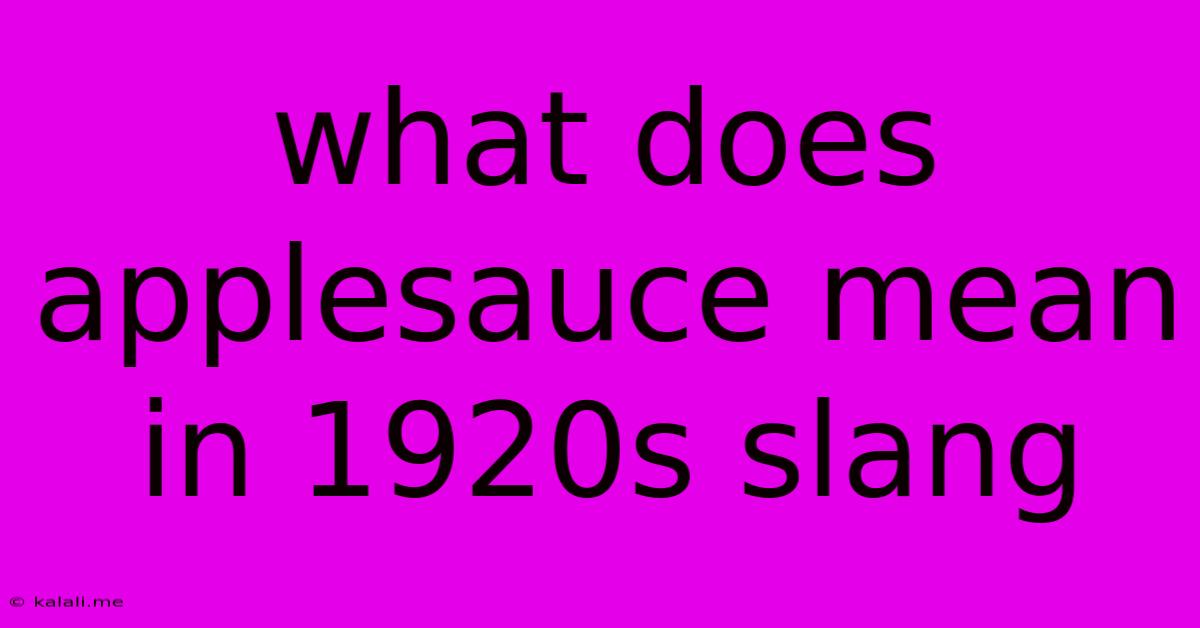What Does Applesauce Mean In 1920s Slang
Kalali
Jun 07, 2025 · 3 min read

Table of Contents
What Does Applesauce Mean in 1920s Slang? Uncovering the Hidden Meaning of a Fruity Term
The 1920s, a decade of flapper dresses, jazz music, and speakeasies, also boasted a vibrant slang lexicon. Many words and phrases took on new, often cheeky, meanings, reflecting the era's rebellious spirit and rapid social change. Among these colorful terms is "applesauce," a word that, surprisingly, didn't refer to the sweet, cooked fruit. So, what did "applesauce" mean in 1920s slang? Let's delve into the fascinating history of this fruity expression.
Applesauce: Not Your Grandma's Dessert
In the roaring twenties, "applesauce" wasn't a culinary term; instead, it was slang for nonsense, rubbish, or something untrue. Think of it as a more playful, less aggressive version of "bullshit" or "balderdash." It was a way to dismiss something as silly, frivolous, or simply untrue without resorting to harsher language. This meaning was particularly prevalent among younger generations, adding to the era's overall sense of youthful rebellion against established norms.
The exact origins of this slang meaning remain somewhat elusive, but it likely emerged from the general sense of "applesauce" as something subtly deceptive or misleading. The sweet, smooth texture of applesauce might have been ironically contrasted with the harsh reality of the information being dismissed as "applesauce."
How "Applesauce" Was Used in the 1920s
Imagine a scenario: a young flapper is being wooed by a charming but possibly dishonest gentleman. If she suspected his romantic advances were insincere, she might playfully retort, "That's a load of applesauce!" This cleverly dismissed his flattery without being overtly confrontational.
This slang term was flexible enough to be used in various contexts. It could be used to dismiss a false rumor, a poorly conceived plan, or even a blatant lie. The context often determined the level of seriousness—sometimes a lighthearted dismissal, other times a more pointed rejection of something false.
Context and Evolution of Slang
Understanding the meaning of slang from bygone eras requires considering the social and cultural context. The 1920s slang, including the use of "applesauce," reflected the changing social landscape and the growing informality of language, particularly among younger generations.
While the term "applesauce" in this slang context has largely faded from modern usage, understanding its 1920s meaning provides a glimpse into the linguistic creativity and social dynamics of the era. It stands as a testament to the ever-evolving nature of language and the way words acquire new meanings over time. This evolution makes studying slang a fascinating journey into the past, revealing the cultural nuances that shaped our language.
Beyond "Applesauce": Exploring Other 1920s Slang
The 1920s saw a surge in slang terms, reflecting the era's dynamism. To fully grasp the linguistic landscape of the Roaring Twenties, exploring other common slang phrases is crucial. Researching other words and their meanings will provide a deeper understanding of the social and cultural contexts that defined this transformative decade. Consider exploring terms related to fashion, prohibition, and the burgeoning jazz scene to further enrich your understanding. This broader research will allow for a richer appreciation of the unique linguistic fingerprint of the 1920s.
Latest Posts
Latest Posts
-
How To Free Space In Steam Cloud Save
Jun 07, 2025
-
How Long Wait To Paint Pressure Treated Wood
Jun 07, 2025
-
How To Remove Scratches From Hardwood
Jun 07, 2025
-
Can You Put Coffee Grounds In The Garbage Disposal
Jun 07, 2025
-
Hooking Up Dishwasher To Garbage Disposal
Jun 07, 2025
Related Post
Thank you for visiting our website which covers about What Does Applesauce Mean In 1920s Slang . We hope the information provided has been useful to you. Feel free to contact us if you have any questions or need further assistance. See you next time and don't miss to bookmark.